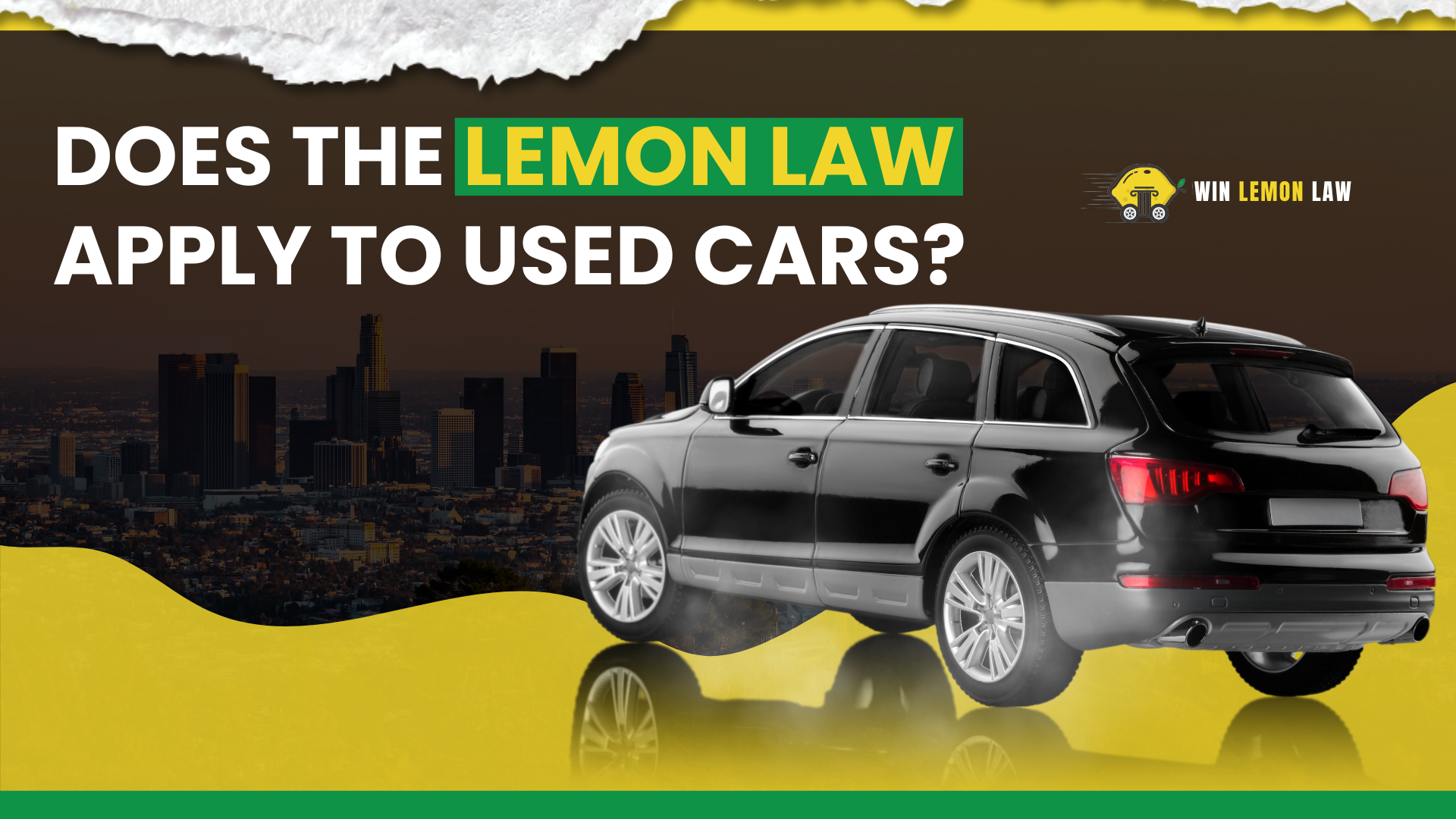Buying a used car can be a cost-effective way to get on the road without breaking the bank. However, what happens if you end up with a lemon? Many people are familiar with the concept of the Lemon Law when it comes to new cars, but does this protection extend to used vehicles as well?
In this post, we will explore the applicability of the Lemon Law to used cars. We’ll discuss how the law works, what protections may be available for used car buyers, and what steps to take if you believe you’ve purchased a lemon.
Understanding your rights and options can help you navigate the complexities of buying a used car and ensure that you’re protected in case of any unexpected issues.
1. Understanding the Lemon Law
The Lemon Law is a set of state laws that provide protection to consumers who have purchased defective vehicles. These laws vary by state, but they generally apply to new vehicles that have substantial defects that affect the safety, value, or use of the vehicle.
The defects must typically occur within a certain period after purchase or within a certain mileage limit. When a consumer experiences these issues, they must give the manufacturer or dealer a reasonable number of attempts to repair the vehicle.
If the vehicle cannot be fixed after a reasonable number of attempts, the consumer is usually entitled to a refund or a replacement vehicle.
Application to Used Cars
The application of the Lemon Law to used cars is more complex. In most states, Lemon Laws do not apply to used cars in the same way they do to new cars. However, some states have “Used Car Lemon Laws” that provide certain protections for used car buyers.
These laws often cover used cars that are still under the manufacturer’s original warranty or have been certified by the manufacturer or dealer.
Key Points:
- Lemon Laws are state laws that provide protection to consumers who purchase defective vehicles.
- Lemon Laws generally apply to new vehicles with substantial defects that affect safety, value, or use.
- Consumers must give the manufacturer or dealer a reasonable number of repair attempts before seeking a refund or replacement.
- Lemon Laws do not typically apply to used cars in the same way they do to new cars.
- Some states have “Used Car Lemon Laws” that provide protections for used car buyers.
2. Coverage for Used Cars

While Lemon Laws primarily focus on new vehicles, some states have extended protections to cover certain used cars. These laws often apply to used cars that are still under their original manufacturer’s warranty or have been certified by the manufacturer or dealer.
Types of Coverage:
Original Warranty
If a used car is still covered by its original manufacturer’s warranty, the Lemon Law may apply. This means that if the vehicle has defects that impair its use, value, or safety, the manufacturer may be required to repair or replace the vehicle, or provide a refund.
Certified Pre-Owned (CPO) Vehicles
Some Lemon Laws cover certified pre-owned vehicles, which are used cars that have been inspected, refurbished, and certified by the manufacturer or dealer. If a CPO vehicle has significant defects, the Lemon Law may entitle the buyer to similar remedies as those provided for new car purchases.
Extended Warranties
In some cases, the Lemon Law may also apply to used cars that are covered by an extended warranty purchased by the consumer.
Requirements and Limitations
- Time and Mileage Limits
Lemon Laws for used cars often have specific time or mileage limits within which defects must occur to be eligible for protection.
- Number of Repair Attempts
Like with new cars, consumers are typically required to give the manufacturer or dealer a reasonable number of repair attempts before seeking a refund or replacement.
- Notice Requirements
Consumers are usually required to notify the manufacturer or dealer of the defect within a certain period after discovering it.
Consulting an Attorney
Navigating the complexities of Lemon Laws for used cars can be challenging. If you believe you’ve purchased a defective used car and are unsure if you’re covered under the Lemon Law, it’s advisable to consult with an experienced attorney who can provide guidance based on your specific circumstances and state laws.
3. Federal Protections
In addition to state-specific Lemon Laws, consumers who purchase used cars are protected by federal regulations, particularly the Federal Trade Commission’s (FTC) Used Car Rule. This rule requires dealers to provide buyers with a Buyer’s Guide, which discloses important information about the vehicle’s warranty status and any potential defects.
Buyer’s Guide:
The Buyer’s Guide is required to be displayed prominently on the vehicle and must contain specific information, such as whether the vehicle is being sold “as is” or with a warranty, the percentage of repair costs the dealer will pay under the warranty, and the major mechanical and electrical systems on the vehicle covered by the warranty.
If the vehicle is sold with a warranty, the Guide must state the duration of the warranty and whether it’s a “full” or “limited” warranty.
The Guide also provides consumers with information about obtaining a vehicle history report and encourages them to have the vehicle inspected by a qualified mechanic before purchasing.
Legal Action:
If a dealer fails to comply with the requirements of the Used Car Rule, buyers may have grounds for legal action under federal law.
Consumers who believe a dealer has violated the Used Car Rule can file a complaint with the FTC, which may result in penalties for the dealer.
Additional Protections:
In addition to the Used Car Rule, consumers who purchase used cars may also be protected by other federal laws, such as the Magnuson-Moss Warranty Act, which regulates warranties on consumer products, including vehicles.
The Magnuson-Moss Warranty Act prohibits deceptive warranty practices and allows consumers to sue manufacturers and sellers for breaches of warranty.

4. Caveats and Limitations
While Lemon Laws and federal regulations provide important protections for consumers who purchase used cars, it’s essential to understand that not all used car purchases will qualify for these protections.
There are several caveats and limitations to consider:
Exclusions:
Lemon Laws and federal regulations may not cover certain types of used car purchases, such as private sales between individuals. Vehicles sold “as-is” are typically not covered by Lemon Laws or warranties, meaning buyers assume all responsibility for any defects or issues with the vehicle.
Cars with expired warranties may also be excluded from Lemon Law protections, as these laws generally apply to vehicles that are still covered by a warranty.
Proving Lemon Status:
Proving that a used car meets the criteria for being considered a lemon can be more challenging than with new vehicles. This is because used cars may have pre-existing issues due to wear and tear, making it difficult to determine if a defect is the result of a manufacturing defect or normal wear and tear.
Consumers may be required to provide evidence of multiple repair attempts or demonstrate that the defect substantially impairs the vehicle’s use, value, or safety to qualify for lemon status.
Legal Complexity:
Pursuing a lemon law claim for a used car can be legally complex and may require the assistance of an experienced attorney. Consumers must navigate state-specific laws, federal regulations, and potentially negotiate with manufacturers or dealers to seek a resolution.
Other Remedies:
If a used car purchase does not qualify for Lemon Law protection, consumers may still have other legal remedies available, such as filing a claim under state consumer protection laws or seeking recourse through arbitration or mediation.
5. Seeking Legal Assistance
If you believe you have purchased a lemon in the form of a used car, seeking legal assistance from an experienced attorney specializing in consumer protection laws is advisable. Here’s how an attorney can help:
Legal Evaluation:
An attorney can evaluate your case to determine if you have grounds for a lemon law claim or other legal remedies. They can review your purchase agreement, warranty information, and repair records to assess the strength of your case.
State and Federal Regulations:
An attorney can help you understand your rights under state Lemon Laws, federal regulations such as the Magnuson-Moss Warranty Act, and other consumer protection laws. They can guide you through the process of filing a claim and represent you in negotiations with manufacturers or dealers.
Negotiation and Representation:
If your case proceeds to negotiation or litigation, an attorney can represent you and advocate on your behalf to seek compensation or other remedies. They can handle communication with the other party and work to achieve a favorable outcome for you.
Legal Expertise:
Consumer protection laws can be complex, and an attorney with experience in this area can provide valuable expertise and guidance. They can help you understand your legal options and make informed decisions about how to proceed with your case.
Cost Considerations:
Many consumer protection attorneys offer free initial consultations and work on a contingency fee basis, meaning you only pay if they win your case. This can help alleviate concerns about upfront costs and make legal representation more accessible to consumers.
Closing
At Win Lemon Law, we are committed to fighting for your rights. If you believe you have purchased a lemon, our experienced team is here to help you understand your rights and options under the law. We have a proven track record of success in handling lemon law claims and will work tirelessly to ensure that you receive the compensation and resolution you deserve.
Don’t let a lemon vehicle sour your driving experience. Contact Win Lemon Law today to schedule a consultation and take the first step towards a sweet resolution.

